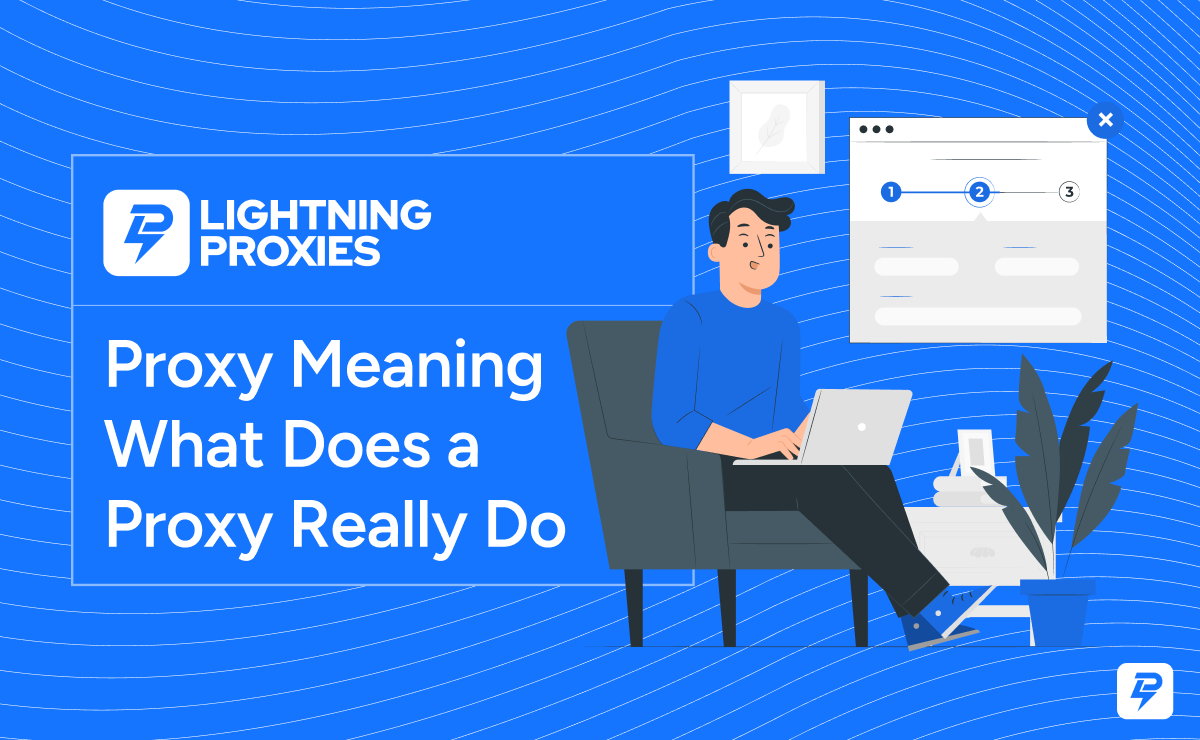Blog / Guide
Write to UsProxy Meaning: What Does a Proxy Really Do
October 3, 2025
Guide

Introduction
If you have searched online for proxy meaning, you are not alone. Thousands of people type that exact phrase every month, trying to understand what a proxy actually is and how it works. The word shows up in conversations about privacy, streaming, marketing, and even online shopping. The good news is that while it sounds technical, the idea is very simple once you break it down.
Proxy Meaning Explained
The word proxy has always meant something that acts on behalf of something else. In real life, if you cannot attend a meeting and you ask a colleague to vote for you, they are your proxy. Online, the idea is the same.
So what does proxy mean in the digital world? A proxy is an intermediary server. Instead of connecting directly to a website, your request goes through the proxy first. The website then sees the proxy's IP address, not your own. In short, the proxy steps in and represents you.
How a Proxy Works
Think about how the process happens in practice. You open a website and hit enter. Instead of sending your request directly, your computer passes it to the proxy server. The proxy forwards it to the target website using its own IP. The site sends a response back to the proxy, and then the proxy delivers it to you.
At no point does the website see your actual IP address. It only sees the proxy. You can imagine it like asking a friend to walk into a shop for you. The cashier sees your friend, not you, even though you are the one who wanted the item. That is the basic meaning of a proxy.
Types of Proxies
Once you understand proxy meaning in general, it is useful to know there are several kinds.
Datacenter proxies
These are created by hosting companies and run on servers. They are known for being fast and affordable, but websites can sometimes detect them more easily.
Residential proxies
These come from real Internet Service Providers. They are attached to actual household devices, which makes them look very natural and harder to block.
Mobile proxies
These are tied to SIM cards and mobile networks such as 4G or 5G. They appear to come from real smartphones and are trusted for mobile testing and ad verification.
Each one is still a proxy. The difference lies in where the IP address comes from and how websites respond to it.

Why People Use Proxies
Now that the proxy meaning is clear, why would anyone actually use one? The reasons range from personal privacy to large-scale business operations.
For individuals:
Proxies can unlock streaming services or websites that are restricted to certain regions. Imagine you are traveling abroad and want to watch your home country's shows. A proxy in your home country makes it look like you are browsing from there.
For businesses:
Proxies are a tool for gathering accurate data. E-commerce companies use them to check competitor pricing in different countries. Marketing teams use them to verify that ads are displayed correctly. SEO professionals rely on proxies to view search results the way real users see them across the world.
In all of these examples, the proxy is doing the same thing. It is standing between the user and the website, providing an alternative IP address and making the traffic look like it comes from somewhere else.
Proxy vs VPN
A lot of people confuse proxies with VPNs. Both hide your IP, but they are not identical. A proxy simply forwards your requests. A VPN also encrypts the traffic. When people search for proxy meaning, they are usually just looking for the basic idea of an intermediary that changes how your IP appears.
Legality and Responsible Use
Proxies are legal. They are widely used by businesses for research, brand protection, and security. What matters is how they are applied. Using a proxy to collect open market data or check how ads display is fine. Using one to engage in illegal activity is not.
With residential and mobile proxies, there is also the question of ethics. A good provider ensures that the people whose IPs are being used are aware of it and give consent. Some even receive compensation. That transparency is important because it makes sure the system is fair for everyone involved.

Conclusion
So, what is the meaning of a proxy in the context of the internet? Simply put, it is a middle layer that represents you when you browse. A proxy hides your real IP address, provides privacy, and allows you to access the internet from different locations.
For individuals, this might mean unlocking content or keeping their identity private. For businesses, it can mean collecting reliable data, protecting ads, or carrying out marketing tasks at scale.
The word may sound technical, but the concept is straightforward: a proxy represents you online, just as a proxy in real life stands in your place.
At LightningProxies, we make it easy to get started with fast, secure, and reliable proxy solutions designed to meet the demands of modern users and businesses alike.

September 29, 2025
Guide
What Is a Residential Proxy: Complete Guide 2025
Learn everything about residential proxies: how they work, types, benefits, and use cases for web scraping and privacy.

October 22, 2025
Comparison
Proxy vs VPN: What's the Difference & Which One Should You Use?
Learn the key differences between proxies and VPNs, including speed, security, and use cases. Discover why proxies are often better for business operations.





